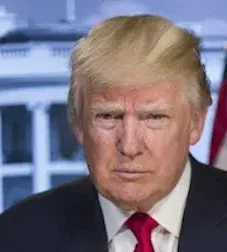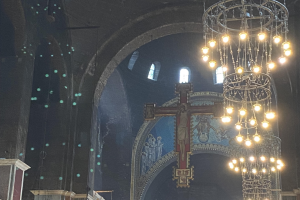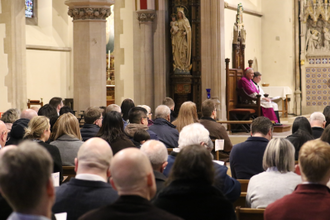Ian Linden - Trump and Iran: History as selective memory

Donald Trump - screenshot
There would not now be a war between Israel and Iran without President Trump. It has been evident for two decades that there were only two ways of stopping Iran going nuclear: either diplomacy or war. On 14 July 2015 the USA, France, China, Russia, Germany, and the EU/UK agreed a Joint Plan of Action, (JPCOA), a nuclear deal to limit and monitor Iran's stockpile and enrichment of uranium in exchange for significant sanctions relief. It had taken years of hard diplomacy to achieve this goal. In March 2018, the IAEA (international Atomic Energy Agency) stated it could verify that Iran had been implementing its JPCOA commitments notably to keep uranium enrichment below 3.67%. Diplomacy had prevailed.
On 8 May 2018, Trump announced the USA's withdrawal from the agreement. Negotiators had carefully ring-fenced the nuclear deal from problems of Iran's missile development, and its support for Houthis, Hezbollah, Hamas and the Syrian regime, but Trump re-introduced these issues as an excuse for sabotaging JPCOA. Heavy pressure from Netanyahu, Israel's Prime Minister, seems to have been influential. A week before, Netanyahu had delivered an inflammatory speech in the White House citing documents allegedly found in a Tehran warehouse, but pertaining to the period before 2003, purporting to show Iran was lying about its claim that its nuclear intentions were peaceful. It took Sir Simon Gass, former British ambassador to Iran and chairman of the Joint Intelligence Committee (JIC) 2019-2023, speaking on the BBC Today programme of 14 June, to point out Trump's role in creating the conditions for war.
Until the USA reneged on the JCPOA agreement in 2018, strengthening the hard-liners, demoralizing the Iranian public, and humiliating President Hourani, Iran's preparations for making a nuclear weapon had been in abeyance. From the perspective of ordinary Iranians, you do not necessarily think possession of a nuclear deterrent is perversely irrational. Some, of course, are opposed to it. A number of States with a military presence near or around Iran's borders have nuclear weapons: Russia, USA, UK, Pakistan and Israel. Iran/Persia has in the past suffered greatly from foreign interventions and invasion. JCPOA took a lot of selling to Shi'a hardliners. To allow the International Atomic Energy Agency (IAEA) thorough monitoring access to Iran's nuclear facilities was a big ask. Despite the regime, in my experience, Iranian national pride is widely shared inside the country. You do not have to be a fanatical Revolutionary Guard commander to believe in national sovereignty and maintaining national security. These are basic principles in and derived from of the UN Charter.
Not surprisingly, with American sanctions restored and in response to the assassination on 20 November 2020 of Mohsen Fakhrizadeh, the 'Father' of Iran's nuclear programme, the Iranian Parliament in reaction passed legislation enabling installation of new centrifuges for uranium enrichment to 20%. After the Israeli attack on the Natanz nuclear facility in 2021, the hardline President Ebrahim Raisi (2021-2024) declared Iran would increase uranium enrichment to 60%. To justify its present war, Israel claims Iran is now able to assemble several atomic bombs and 'weaponise' them. That has been questioned by sources in the CIA. Remember Sadam's 'weapons of mass destruction'? Iran pulled out of talks with the USA in Muscat on 15 June in Oman.
Not surprisingly, Trump does not refer back to his historically damaging 2015 decision. Indeed, with his customary inconsistency, he has described the current Israeli attacks on Iran as "excellent" and called for Iran's "unconditional surrender". Trumpian peace-making has three steps reminiscent of the school playground: decide who is winning, back them, deride the loser.
Meanwhile Netanyahu is moving on from talk of Iran's existential threat to Israel to regime change in Iran. However despicable the human rights record of Iran's rulers, the velayat-al-faqih (guardianship of the - Shi'a - jurist) in which the Supreme Leader, Ayatollah Khamenei, supported by the Revolutionary Guards is a de facto dictator despite parliamentary trappings, interventions sponsoring regime change in Iraq and Libya are a dire warning to pursuing the same goal in Iran..
The current Iran war raises fundamental questions about Trump's role in the new world disorder: the use of naked power, impunity, disinformation, and distortion of the past. In Stalin's famously cynical words "It is always difficult to predict the past". In Orwell's words: "Who controls the past controls the future. Who controls the present controls the past." A control largely managed through social media, what computer scientist Kate Starbird calls "participatory disinformation" (Sage Journals 2023). We now recognise this rewriting of history as a tool of populist authoritarianism. In Trump this manifests itself in his belief in an imaginary past and insistence on history as an exercise in narrating America's greatness.
Are we watching cognitive decline? calculated political manipulation of history? Mere wishful thinking? Probably all of these. While driving with young children on the back seat I once asked 'did you see the stoat crossing the road", a wonderful, fast elongate wiggling form, tail flowing out behind. Back came the answer 'yes and it had a rabbit in its mouth'. It didn't. (3-4 year-old children have yet to distinguish in their minds between what is true and what they would like to be true).
And this is reminiscent of Trump's assertion that the US 2020 elections were rigged, demonstrably untrue, and that the crowds at his first inauguration were bigger than those at Obama's, pictures clearly showing they weren't. The Commander-in-Chief of the most powerful country in the world also holds a children's storybook versions of US history and is set on American children learning it.
To read on see: www.ianlinden.com/latest-blogs/trump-iran-history-as-selective-memory
Professor Ian Linden is Visiting Professor at St Mary's University, Strawberry Hill, London. A past director of the Catholic Institute for International Relations, he was awarded a CMG for his work for human rights in 2000. He has also been an adviser on Europe and Justice and Peace issues to the Department of International Affairs of the Catholic Bishops Conference of England and Wales. Ian chairs a new charity for After-school schooling in Beirut for Syrian refugees and Lebanese kids in danger of dropping out partnering with CARITAS Lebanon and work on board of Las Casas Institute in Oxford with Richard Finn OP. His latest book was Global Catholicism published by Hurst in 2009.


















